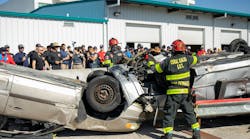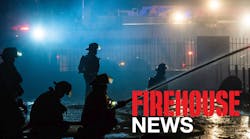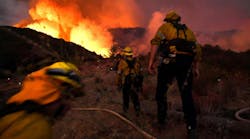When Matt Wilson, a fire captain with 10 years of service, took a hard look at his future in the fire service and evaluated his training and education credentials in light of what is required these days by fire departments to promote to leadership management positions, he realized that he does not have what it takes. He completed all required state fire marshal training courses and more, and he took academic classes here and there, but never set out to actually earn an associate's degree from his local community college or for that matter a bachelor's degree from a provider of the National Fire Academy baccalaureate program in his state.
Currently, in many states, a bachelor of science degree in fire science is required of junior fire professionals to promote to senior positions. Matt does not meet this requirement and is in a quandary about where to start. The prospect of going back to school, devoting long hours to studying, and balancing his job, family, and school obligations is daunting and discouraging for now.
Matt is part of an ever-growing number of fire and emergency professionals heading back to the classroom after double-digit years of hiatus. Fueled by economic factors, higher standards for promotion and increased competition, fire service veterans are finding it necessary to return to school and earn accredited fire science degrees to become eligible for promotion and update their knowledge to better serve their fire departments and communities.
The primary reason many working adults resist returning to the classroom is that it is logistically more challenging for older students to graduate than for fresh-faced undergraduates. According to the Lumina Foundation, a private research organization that specializes in studying the educational needs of underserved students, more than 30% of all college students are adult learners ages 25 and above. In reality, colleges and universities frequently focus more heavily on the needs of students below the age of 22 and oftentimes do not acknowledge and smooth out the obstacles that working adults face.
For Susan Hayward, a 45-year-old fire officer and mother of two who recently completed an associate's degree in fire science at her local community college, fear not only long kept her from returning to school, it nearly caused her to drop out.
"I was very uncomfortable on the first night of class; I left in the middle of the class with tears in my eyes," she recalled. "I didn't think I was smart enough as those 18-year-old kids. I had not been in a classroom for over 20 years. I was terrified!"
An additional challenge facing fire and emergency services professionals planning to return to school is choosing a school and academic program compatible with their long-term goals, their state or fire department education requirements in terms of accreditation and certification, and balancing school with family and work obligations. This article seeks to address these challenges and offer returning adult learners in the fire service a clear road map to follow toward attaining their goal of becoming a college graduate with an accredited education infused with excellence and certified by the National Fire Academy's Fire and Emergency Services Higher Education consortium.
Educational Indicators
There are educational indicators to consider when selecting a program of study:
-
Curriculum relevance, professional recognition and track record. Regardless of your ultimate goal, as a fire and emergency professional, it works to your advantage in terms of competitiveness and service to choose a degree program that is focused and specialized enough to meet the needs of your fire department and the community. A degree in fire science with concentration in fire administration or fire prevention and fire technology is desirable at most fire departments and state fire marshal offices. Nowadays, it is not enough to show proof of just any bachelor's degree, such as in public administration or occupational studies. It is preferred, and at times required, that a candidate's degree classwork feature specialized courses with titles such as Advanced Fire Administration, Fire Prevention and Organization, Fire Protection Structures and Systems, Legal and Political Foundations of the Fire Service, Fire Investigation and Analysis, Disasters and Fire Defense Planning and Application of Fire Research.
The immediate question that arises is how to find schools that offer such a specialized fire science-oriented curriculum. There is one source for all the information you need in this regard: the Fire and Emergency Services Higher Education (FESHE) school consortium sponsored by the National Fire Academy. The FESHE curriculum is one of a kind and is the product of decades of collaborations between a team of subject-matter experts from seven consortium colleges and universities and numerous community colleges and fire departments in the United States since 1978.
In your choice of a program in fire science, think FESHE and ask FESHE-related questions. Most community colleges that offer lower-division fire science courses follow the FESHE model of higher education. Upon completing an associate of science degree in fire science from a FESHE provider, contact one of the seven consortium schools that offer the upper-division baccalaureate FESHE. For more information on the FESHE program, visit the USFA website at http://www.usfa.dhs.gov/nfa/higher_ed/index.shtm.
-
Accreditation and certification. A continued regional accreditation is an important indicator that a school is reputable and has met certain quality standards set by accreditation agencies approved by the U.S. Department of Education. The most widely recognized accreditation for degree-granting programs comes from the six regional accreditation commissions. The Distance Education & Training Council (DETC) is another accreditation agency that specializes in distance education institutions.
It is your responsibility to do your homework in this regard. Ask when the school and program were accredited and by what agency, then find accreditation documentation on the school website or by requesting it. You do not want to earn a degree from a non-accredited institution that no employer will recognize. Beware of diploma mills scams. As previously emphasized, ascertain that the school and program of your choice are certified by the National Fire Academy and local state fire marshal's office to offer the FESHE curriculum.
-
Transfer of earned academic credits. If you have earned academic credits from other accredited institutions that are relevant to your selected program, negotiate, when possible, that these units are accepted and factored into your new program of study. Equally important, inquire whether the credits you earn in the new program will be accepted if you decide to complete your program elsewhere. In general, regionally accredited schools recognize one another as equals for the purpose of transferring credits. Of secondary importance is checking whether your new program of choice offers academic credit for certain National Fire Academy and state fire marshal certification with relevance to the FESHE curriculum.
In considering your options in terms of the upper-division FESHE baccalaureate program, inquire whether the program of your choice has articulation agreements with your local community college provider of a fire science associate of science degree program. Such articulation agreement guarantees transfer of your lower-division course work to count toward a bachelor of science degree in fire science.
-
Course delivery for online programs. Distance education course delivery comes in different forms. Courses can be taken in real-time (synchronous), self-paced (asynchronous) or a hybrid of both. Synchronous courses are popular with students who enjoy highly interactive learning. Asynchronous courses provide the convenience of letting students determine their own schedules (of course, within reasonable limits) by accessing posted materials and completing assignments in a sequential format by a certain deadline. This format is especially suited to those who work varying shifts.
-
Quality of instructors. Your educational experience is largely determined by the quality of your instructors, who are expected to combine expertise in their course subjects with instructional skills. A quality instructor in the field of fire science is required to have at least 15 years of active duty in the fire and emergency services, a master's degree in a related field and at least three years of teaching experience. A good instructor will stimulate dynamic and interactive classroom discussions, prepare engaging lesson plans, create a sense of community in the class and empower students to be proactive in their own learning. A good distance education instructor can also be accessible by telephone and in person when necessary.
- Program management and student services. A quality fire science program is usually managed by seasoned administrator who combines credentials in distance education administration and adult education. A good program director/coordinator serves as an advisor and coach to students, coaches and supervises the program faculty, and oversees the distance education course management system and curriculum. Albeit the fact that distance education learners are not required to be physically present on a campus, a good distance education program provides students with important resources and services via distance, such as: online resource center and library, sophisticated technology infrastructure, academic advisors who are available throughout the student's program of study, technical support desk, financial aid office, alumni network, and online student forums such as message boards or chat rooms.
- Cost. The monetary cost of earning an academic degree is a real investment and a serious point of consideration. Many variables must be considered. Tuition and fees vary widely, depending on the school, program, degree and residency. Distance education costs generally include tuition and fees, books and class materials, potential income reduction while in school, Internet service provider, software (word-processing, spreadsheet and anti-virus), and hardware (computer, printer, webcam, CD-ROM drive, DVD drive and scanner).
- Financial aid. A quality education program/school can provide a variety of financial-aid packages such as scholarships, grants and student loans. Per the popular option, federal student loans, your school must be Title IV eligible, which proves that the institution meets the U.S. Department of Education criteria for extending federal loans to its students. Many of the newer distance-education institutions are still awaiting Title IV status, as distance education is a new endeavor in the business of higher education. Contact the financial aid officer of the school of your choice and discuss your options. Also, many fire departments offer tuition reimbursement programs to qualified employees.
Conclusion
The prospect of returning to school after many years of hiatus can be challenging for fire and emergency services professionals. The existence and availability of the FESHE model of higher education through a network of accredited college and universities can facilitate this effort. Think about your long-term personal, professional and academic goals, consider your financial situation and take action. The ball is in your court.
YOUNES MOURCHID, Ph.D., is an associate professor and the director of the Degrees at a Distance Program (DDP) - Fire Science at Cogswell Polytechnical College in Sunnyvale, CA.





